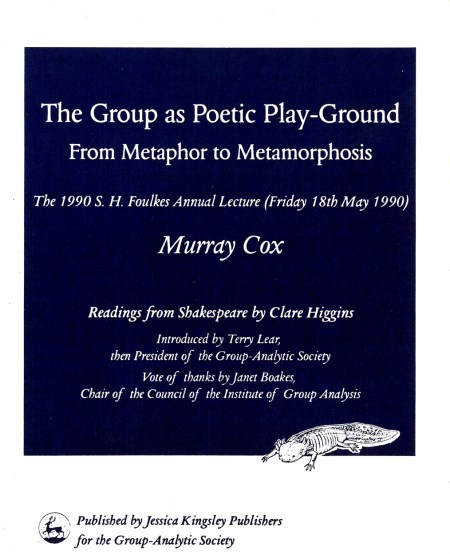This lecture explores some aspects of creativity, metaphor and language which are common to the worlds of group analysis and poetry/drama. Both depend upon poiesis the calling into existence of that which was not there before and responsive enactment.
One of the aims of psychotherapy is to re-call and integrate previously repressed experience. This is particularly important in forensic psychotherapy. In the lecture the concept of omniference is introduced; this is the all-carrying-allness of the group, including the conductor, which makes analysis not only tolerable and safe, but actually inviting.
Group analysis and dramatic enactment both need an adequate play-ground; a space set aside in which it is safe to play. The lecture cites passages from Freud, Foulkes and Winnicott which refer to the comparison between the work of the therapist and that of the creative artist. It develops three Foulksian themes: first, trusting the group; second, consideration of group levels, with particular reference to the primordial level; third, the relevance of group analytic psychotherapy to forensic issues. Trustful witnessing pays equal attention to the individual members of the group and the group-as-a-whole. Group analysis aims to utilize the creative energy inherent in matrix and metaphor to bring about affective realignment, thereby resolving transference thus attempting to achieve metamorphosis, through modification of intrapsychic structure.
After a plea for constructive dialogue between theology and group-analytic concerns, the proceedings close with readings from Shakespeare on related themes
One of the aims of psychotherapy is to re-call and integrate previously repressed experience. This is particularly important in forensic psychotherapy. In the lecture the concept of omniference is introduced; this is the all-carrying-allness of the group, including the conductor, which makes analysis not only tolerable and safe, but actually inviting.
Group analysis and dramatic enactment both need an adequate play-ground; a space set aside in which it is safe to play. The lecture cites passages from Freud, Foulkes and Winnicott which refer to the comparison between the work of the therapist and that of the creative artist. It develops three Foulksian themes: first, trusting the group; second, consideration of group levels, with particular reference to the primordial level; third, the relevance of group analytic psychotherapy to forensic issues. Trustful witnessing pays equal attention to the individual members of the group and the group-as-a-whole. Group analysis aims to utilize the creative energy inherent in matrix and metaphor to bring about affective realignment, thereby resolving transference thus attempting to achieve metamorphosis, through modification of intrapsychic structure.
After a plea for constructive dialogue between theology and group-analytic concerns, the proceedings close with readings from Shakespeare on related themes
Newsletter Signup
By clicking ‘Sign Up,’ I acknowledge that I have read and agree to Hachette Book Group’s Privacy Policy and Terms of Use
Reviews
If you want inspiration, listen to this tape. What you will find is a coruscating display of primary-process functioning and evidence of the mutative processes that are released by a preparedness to be never quite prepared.
